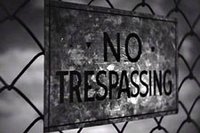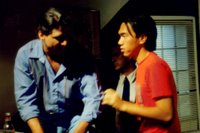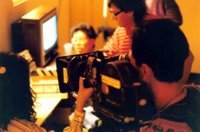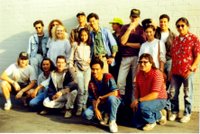My Calling
Rushing, I remember. I was rushing back to my rented house from KDU, the college where I was studying. I hurried in and turned on the TV which was in the living room. It was one of those Dunhill Movie Festivals but the one I was watching was different, I’ve heard of it but now I had the chance to watch it.
Mesmerized I was to the screen as the RKO STUDIO title came up... The subsequent NO TRESPASSING signboard... the camera cranes up. That was my first introduction to great black and white film and I remembered vividly that I have always love movies but Orson Welles somehow changed my life. I was yet to be introduced to film language, mise-en-scene, auteur, etc..., but the film sucked me in ways that I know that I understood what I wanted to do with my life after that. My calling.
RKO STUDIO title came up... The subsequent NO TRESPASSING signboard... the camera cranes up. That was my first introduction to great black and white film and I remembered vividly that I have always love movies but Orson Welles somehow changed my life. I was yet to be introduced to film language, mise-en-scene, auteur, etc..., but the film sucked me in ways that I know that I understood what I wanted to do with my life after that. My calling.
The next semester, a visiting Drama Professor from Penn State came for a season. She would have the first major influence in my life when I took her drama module. (The one thing that I’m guilty of here is for not remembering her name, for that I apologize) Immediately, I know what I was good at. Somehow I knew what I was doing and my love for the craft slowly deepened.
 The one person that is a major influence was my lecturer at Columbia-College by the name of JEDEDIAH HORNER (That name I will not forget). He was already in his 70s and tough towards the students during class. Students were not allowed to sit on the same seat in each of the classes. Mr. Horner said that one should not get comfortable in one position because that would make the person complacent. I took extra classes with him out of the college where he taught me the art of acting and directing. I owe my attention to details and discipline in filmmaking to Mr. Horner.
The one person that is a major influence was my lecturer at Columbia-College by the name of JEDEDIAH HORNER (That name I will not forget). He was already in his 70s and tough towards the students during class. Students were not allowed to sit on the same seat in each of the classes. Mr. Horner said that one should not get comfortable in one position because that would make the person complacent. I took extra classes with him out of the college where he taught me the art of acting and directing. I owe my attention to details and discipline in filmmaking to Mr. Horner.
Orson Welles introduced me to the possibilities of cinema, the Drama Professor introduced me to the craft of acting and Mr. Jedediah Horner gave me the courage and discipline in honing my filmmaking abilities. To the three of them, my deepest gratitude. Rosebud rules.
Mesmerized I was to the screen as the
 RKO STUDIO title came up... The subsequent NO TRESPASSING signboard... the camera cranes up. That was my first introduction to great black and white film and I remembered vividly that I have always love movies but Orson Welles somehow changed my life. I was yet to be introduced to film language, mise-en-scene, auteur, etc..., but the film sucked me in ways that I know that I understood what I wanted to do with my life after that. My calling.
RKO STUDIO title came up... The subsequent NO TRESPASSING signboard... the camera cranes up. That was my first introduction to great black and white film and I remembered vividly that I have always love movies but Orson Welles somehow changed my life. I was yet to be introduced to film language, mise-en-scene, auteur, etc..., but the film sucked me in ways that I know that I understood what I wanted to do with my life after that. My calling.The next semester, a visiting Drama Professor from Penn State came for a season. She would have the first major influence in my life when I took her drama module. (The one thing that I’m guilty of here is for not remembering her name, for that I apologize) Immediately, I know what I was good at. Somehow I knew what I was doing and my love for the craft slowly deepened.
 The one person that is a major influence was my lecturer at Columbia-College by the name of JEDEDIAH HORNER (That name I will not forget). He was already in his 70s and tough towards the students during class. Students were not allowed to sit on the same seat in each of the classes. Mr. Horner said that one should not get comfortable in one position because that would make the person complacent. I took extra classes with him out of the college where he taught me the art of acting and directing. I owe my attention to details and discipline in filmmaking to Mr. Horner.
The one person that is a major influence was my lecturer at Columbia-College by the name of JEDEDIAH HORNER (That name I will not forget). He was already in his 70s and tough towards the students during class. Students were not allowed to sit on the same seat in each of the classes. Mr. Horner said that one should not get comfortable in one position because that would make the person complacent. I took extra classes with him out of the college where he taught me the art of acting and directing. I owe my attention to details and discipline in filmmaking to Mr. Horner.Orson Welles introduced me to the possibilities of cinema, the Drama Professor introduced me to the craft of acting and Mr. Jedediah Horner gave me the courage and discipline in honing my filmmaking abilities. To the three of them, my deepest gratitude. Rosebud rules.






